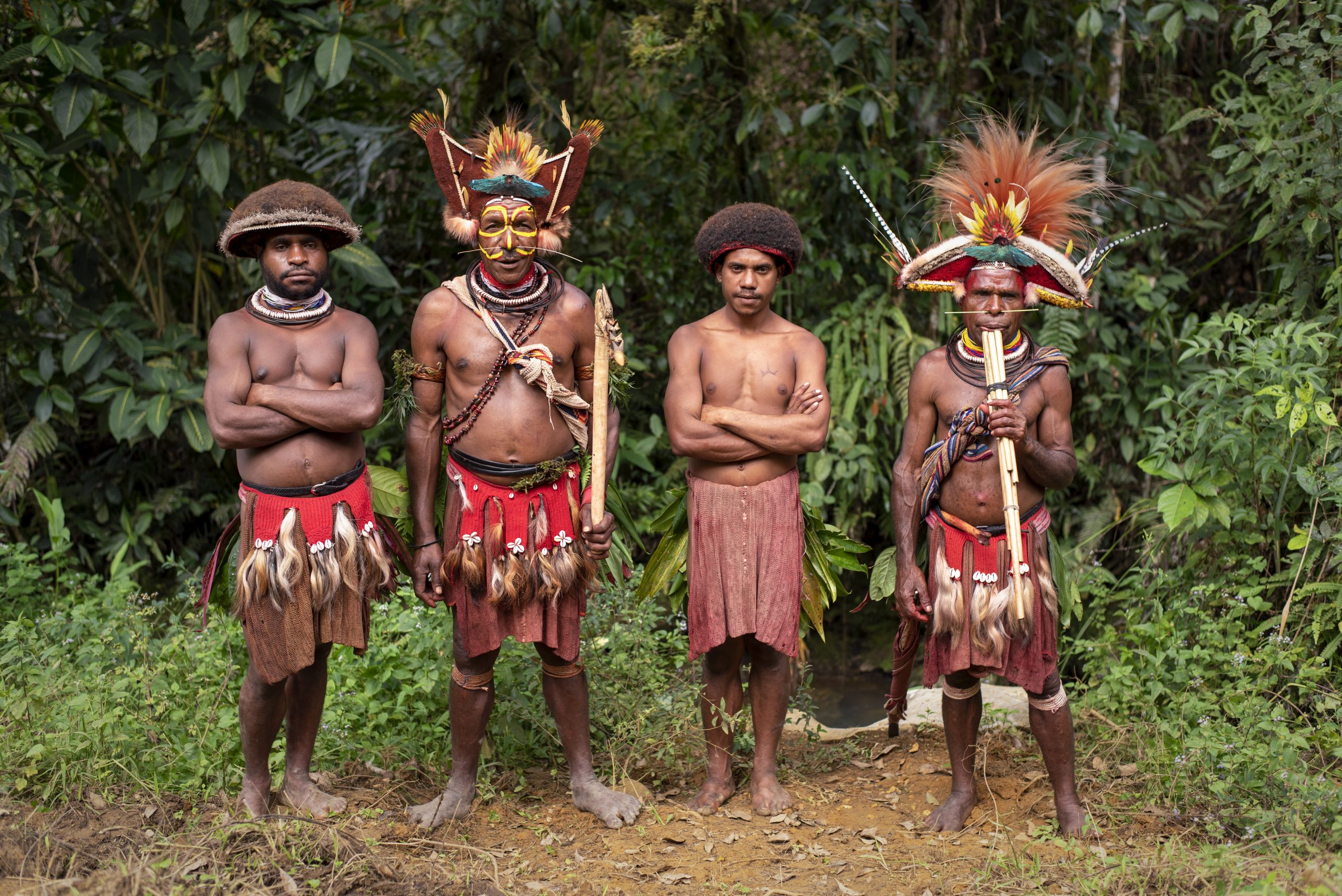I did not sleep well. The mattress should not bear the name. It’s so thin, with a hard wooden bed underneath that only allowed me to lie on my back. The pillow smells like the many people who used it for me and the beetles outside kept roaring. I also heard a lot of mice walking over our roof and Yuri had to go to the toilet several times. A typical night in Papua New Guinea.
So we are a bit tired when we are served delicious scrambled egg for breakfast. We arrived yesterday at Lukwanda lodge . It was dark and wet when we arrived. It is still wet now but oh how green it is here. And what birds I heard this morning. The lodge is very simple but it is fine. These days we will have to do with little because our luggage is still in London thanks to British Airways. Who then makes little effort to get our luggage here in Papua New Guinea. But we are now in Tari and the chance that the luggage will be brought here is nil.
We quickly throw in a cup of tea before we set off. We don’t really know where to go, but we do know that we are going to eat Mumu, a local delicacy. At least, we assume that.
Introduction to the mud trails
The trail to today’s village starts near the lodge. Because there is a war going on between two families, we cannot go too far into the wilderness because we may run into people we don’t want to meet. So we stay close to home, but even that makes for an adventure.
And that adventure begins with our introduction to the mud trails of Papua New Guinea. We slide down a kind of hill before balancing on a thin tree trunk over a large river. Then we climb a mud path to walk a bit through fields. We end at a cabin on a hill overlooking the Tari River. A large river where the water has risen considerably due to the amount of rain in recent days. We always bring rain with us, so that will probably not decrease in the coming days.
Actually, we were supposed to cross the river to eat Mumu in the village across the street. But due to the amount of water and the strong current in the river, we decide to make the Mumu at this house. Not a problem for us. It is fun and the owners of the piece of land take us around their land.
The family
The piece of land belongs to two brothers. Their father, who says he’s 120, is now enjoying his old age. There is no longer a mother. The two brothers are the owners, but the sisters, from another mother, are the ones who work the land. Along with a number of pigs. The sister, Ruth, who now works here shows us with hands and feet what she does. English is not spoken here, so we rely on sign language. And that’s fine. I understand that they grow sweet potato and broccoli, that the pigs are helping to turn the land, and that they are glad we are here.

Ruth, one of the sisters
After the small tour we go back to the house on the hill. Here we are going to make the Mumu. A typical dish from Papua New Guinea, and something they are very proud of. First they heat up stones on the fire. Then they dig a hole in the ground. In the meantime, a chicken is killed, vegetables and fruits are cut. Incidentally, I was not allowed to call it slaughter. That is so Western. Here in Papua New Guinea they just call it killing. And they are right.

Hugging a chicken that’s soon gonna be our meal.
The hole in the ground is first filled with the heated stones, on top of that are banana leaves in which the food is placed. The banana leaves are also put back on top to protect the food properly, followed by more warm stones. To close it well, the soil is shoveled on top of the stones. And so the food remains for more than 1.5 hours.

Picking chickens
Family quarrel in Papua New Guinea
With us a little longer because just after preparing the Mumu a small disagreement arose between the family members. At least it starts small, with some shouting and screaming. But soon, much to my delight, a machete is brought in. There are also sticks and the family members start to hit each other fairly hard. The machete is mainly used as a threat, but I still think it is dangerous. A number of times I am reassured with “don’t worry, family problems” and big smiles from everyone who does not belong to the family. Thomas tries to appease it several times, to no avail. I just keep a safe distance because even though they won’t attack me, the waving with the machetes doesn’t look very safe. After all, an accident can happen in a small corner.
They are an explosive people and that shows how this quarrel suddenly started. One moment we are all making Mumu and the next moment we are waving machetes. Of course this also concerns pieces of land. Some people have more than others and jealousy plays a big role.

And just as suddenly as it began, so suddenly it ends. The Mumu is ready and it is a shame to waste the vegetables and two chickens because of a pointless argument. So soon we are all enjoying the Mumu again. The banana that went in is very dry, the pawpaw (kind of papaya) is delicious, the sweet potato is also fantastic and I even enjoy eating the chicken.
The Huli Wigmen
After dinner it is time for the fortune teller. We are in the Huli Wigmen area. A tribe that I have wanted to see since 2005 when a colleague from MinBuZa went to Papua New Guinea. And now I am here and I have time to meet the Huli Wigmen. The Huli is the largest tribe in the country and is known for the wigs they make from their own hair. There are different wigs for different occasions.

A common wig takes about one year to make. It is the first wig that boys grow when they become men. For a year they sleep with a wooden block under their neck to shape the wig, they do this with a kind of wire. The wig as above is a special one, it takes about 2 to 3 years to make.
On special occasions they color their faces with bright yellow clay (this is called ambua) and are considered sacred. Their bodies make them ocher red. When they dance, during the sing-sing, they do a bird dance. Not to be confused with the terrible bird dance that we know in the Netherlands. With this bird dance they imitate the bird of paradise.

The Huli also do fortune counting. In this region there is one fortune teller left and we are going to meet him. His name is Erebo and he is dressed in his most beautiful Huli costume. Before we can enter the sanctuary, the forefathers must first be awakened. That happens in less than a minute.

Erebo
The fortune teller
We walk through a piece of woodland to finally arrive at a small clearing between all kinds of beautiful green trees and plants. In this clearing is a structure of wooden posts and planks on top of each other. I don’t know what it represents, but when we walk around it we suddenly see a number of yellow painted skulls in a row. Thomas knows how to tell us these are the ancestors. Nine generations of skulls lie ahead of us.
Erebo has now started the ceremony. It is a kind of song with words that cannot be understood. Thomas occasionally encourages him to continue singing. And when he stops, it’s time for Yuri to ask a question. He wants to know how the future of his love life is going. Erebo then asks the question to his forefathers. They don’t take long to answer; it stands in front of you
Erebo makes it a bit more exciting and indicates that the person with whom Yuri grows old might be traveling with him. Maybe she’s here. What do you think?
We say goodbye to Erebo and return to the lodge. To rest because tomorrow we are going to make a long trek to a village somewhere in the middle of nowhere.




Super leuk om te lezen! X
Ah leuk dat je reageert! Nog leuker om mee te maken trouwens 😉 xxx
Mooi verhaal en prachtige foto’s! Wat een belevenis zeg. ?
Ah dankjewel! Eindelijk mn ‘creatief schrijven’ cursus in de praktijk brengen 😉 Het is hier zeker een heel avontuur. xxx